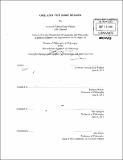One and the same reason
Author(s)
Walden, Kenneth Edward Dale
DownloadFull printable version (10.34Mb)
Other Contributors
Massachusetts Institute of Technology. Dept. of Linguistics and Philosophy.
Advisor
Richard Holton and Rae Langton.
Terms of use
Metadata
Show full item recordAbstract
My dissertation is about the relationship between theoretical and practical reason. I argue that these two kinds of reason are unified in important respects. In Chapter One I argue that there is a single, fundamental kind of reasoning (roughly, unrestrained self-reflection) and that theoretical and practical reason ought to be understood as instances of this more fundamental kind of reasoning, distinguished only by their subject matter. I then argue that two formulations of Kant's Categorical Imperative jointly codify the activity of this basic reasoning. Therefore, the Categorical Imperative is, in this sense, the supreme principle of reason. In Chapter Two I show how the very abstract norms formulated in Chapter One can be sharpened if we connect them to the conditions of human agency. I argue that the demands of being an agent require us to submit to a procedure of negotiation and legislation with other agents that is similar to the contractualism of Hobbes and Rawls. The difference between my view and theirs is that my contractualism, because it is tied to our agency, issues in categorical requirements. In Chapter Three I develop a theory of normative concepts that satisfies two demands that have appeared incompatible: the demand that our normative concepts be intimately connected to human nature and the demand that normative items be things we aspire to, and thus things that are relevantly beyond us and our activities. I show how we can satisfy both of these desiderata through an open-ended constructivism that understands normative items as transcendent ideals. In Chapter Four I argue that a robust, philosophically serviceable distinction between theoretical judgments about the world and practical judgments about what one ought to do cannot be sustained because these two kinds of judgments are inextricably entangled. They are entangled because we must employ both kinds of judgment to fully explain actions. This fact entails that practical and theoretical judgments occupy a single holistic theory.
Description
Thesis (Ph. D.)--Massachusetts Institute of Technology, Dept. of Linguistics and Philosophy, September 2011. Cataloged from PDF version of thesis. Includes bibliographical references (p. 147-155).
Date issued
2011Department
Massachusetts Institute of Technology. Department of Linguistics and PhilosophyPublisher
Massachusetts Institute of Technology
Keywords
Linguistics and Philosophy.